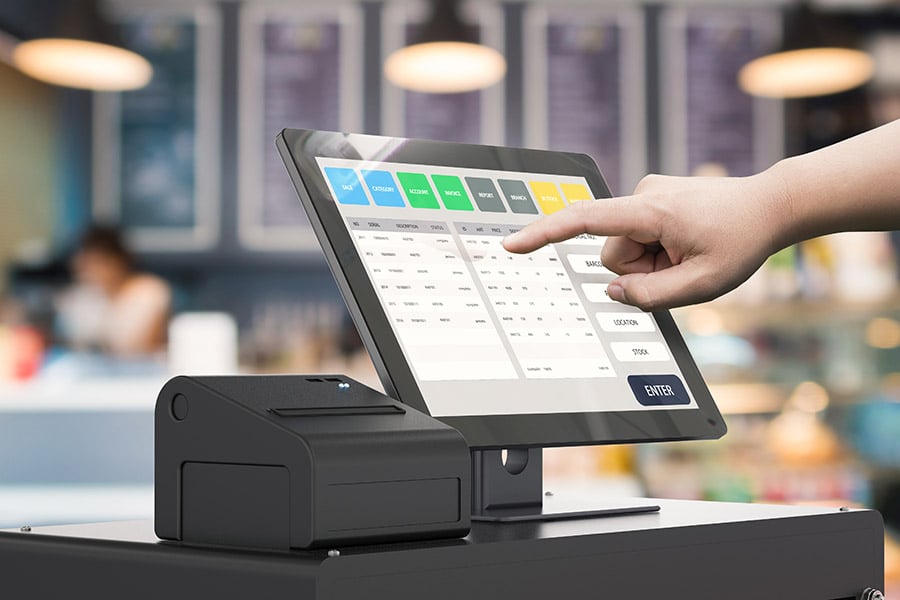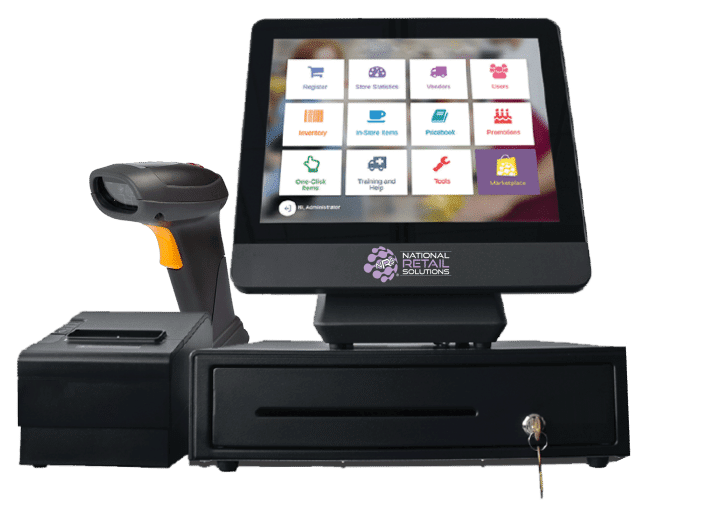The Only Guide to Point Of Sale

POS Systems: Retail Point-Of-Sale Solutions Streamline Transactions
The 20-Second Trick For Pos System For Small Business

Hardware Components of a Point of Sale System What makes a POS system tick? It's not simply software; the hardware plays a starring role. Think of it as the body to the software's brain. Without the best hardware, even the most advanced POS software is just a pretty face. Important POS Hardware So, what are the must-haves? Let's break it down. The main processing system, frequently a computer or tablet, is the heart of the operation. The display or touchscreen display permits personnel to engage with the system. A barcode scanner accelerate the checkout process. Keep in mind the days of manually entering each code? The reliable receipt printer provides clients with a record of their purchase. A cash drawer keeps your money safe and arranged. A card reader enables clients to pay with credit or debit cards. Diving Deeper: Beyond the Basics However wait, there's more! Depending upon your service, you might read more require specialized hardware. For instance, a dining establishment might incorporate kitchen printers to relay orders, while a retail store might use label printers for product tagging. Ever question how your regional pastry shop quickly prints those delicious-looking labels? Selecting the Right Hardware: A Balancing Act Selecting the right hardware isn't almost buying the most costly devices. It's about discovering the sweet area between performance, durability, and budget plan. A small company just starting out may decide for a more basic setup, while a high-volume merchant will require robust, high-performance makers. Is it much better to purchase new or utilized? Consider your alternatives thoroughly. A brand-new system provides the newest technology and warranty security, however a reconditioned system can conserve you money. The Future of POS Hardware What does the future hold? Anticipate to see a lot more integration with mobile phones, biometric scanners for staff member authentication, and advanced analytics dashboards displayed on bigger, clearer screens. Imagine a world where inventory is immediately upgraded in real-time as items are scanned-- a world where you can track your best-selling item from anywhere in the world. The possibilities are limitless, and the hardware is continually progressing to fulfill the demands of today's businesses. Are you all set to update your point of sale system?
Software Application Characteristics and Capabilities: The Heart of Your POS System
Ever watch a skilled barista slide through a hectic early morning rush? Their trick isn't simply caffeine; it's a smooth dance with their POS system. The software is the conductor of your service symphony, orchestrating everything from sales to inventory. But what notes should you be listening for? What capabilities really matter in today's market?
Stock Management: Beyond Counting Beans
Forget spreadsheets that haunt your dreams. Modern POS systems offer real-time stock tracking, alerting you when your stock of artisanal coffee beans dips precariously low. Think about it as a digital guardian angel, preventing those uncomfortable "Sorry, we're out!" moments to customers. What if you could likewise anticipate demand based upon historic information? Numerous systems now use forecasting tools, a powerful weapon against overstocking and lost sales. This assists avoid the circumstance of running out of popular products or building up excess inventory of slow-moving products, both of which can constrain capital and area.
Sales Reporting and Analytics: Deciphering the Data
Sales data is the brand-new gold, and your POS system is the miner. Forget feeling in one's bones how much you sold today. Dive deep into the data to discover trends, determine your best-selling items, and understand client behavior. Which menu item pairs completely with the day-to-day special? Which promo resonated most with your clients? These insights are not simply intriguing; they're actionable intelligence. Without trusted sales reporting, navigating the intricacies of organization decision-making ends up being like sailing without a compass, increasing the opportunity of missteps and missed out on chances.
Client Relationship Management (CRM): Structure Bridges, Not Walls
Keeping in mind a regular client's name and preferred order is charming, however scaling that personal touch is tricky. POS systems with CRM abilities enable you to track client purchase history, preferences, and even birthdays. Envision automatically using a discount on their birthday-- a little gesture that fosters commitment and encourages repeat company. However there is the prospective snag of bad data quality, which can result in inaccurate customer profiles and inadequate marketing efforts.
Payment Processing: Streamlining the Transaction
The checkout experience can make or break a sale. Seamless integration with various payment approaches-- charge card, mobile wallets, even copyright-- is non-negotiable. Can your system manage split payments? Does it provide secure tokenization to protect client data? A clunky payment procedure is like striking a sour note in your service symphony, possibly interrupting the entire efficiency. Making sure compatibility with developing payment technologies and adherence to security requirements are vital for keeping customer trust and operational effectiveness.
Employee Management: Keeping the Team in Sync
From clocking in and out to handling permissions and tracking performance, staff member management features enhance operations and enhance responsibility. Is scheduling a problem? Numerous POS systems use integrated scheduling tools, optimizing staffing levels based on predicted need. A common barrier that is frequently neglected is the obstacle of incorporating staff member management functionalities with payroll systems, which can lead to mistakes and inefficiencies in wage calculations.
Advanced Features: Leveling Up Your Operations
- Table Management: Suitable for restaurants, this function permits you to visualize your dining-room, track table status, and manage reservations.
- Loyalty Programs: Reward your best clients and motivate repeat business with incorporated loyalty programs.
- Online Buying Combination: Effortlessly integrate your POS system with online ordering platforms to expand your reach.
Selecting the best POS system has to do with more than simply performance; it's about finding a partner that can grow with your business. Consider your existing requirements, prepare for future development, and do not be afraid to ask the tough concerns. The best software can transform your business from a chaotic cacophony into a harmonious masterpiece.
Industry-Specific POS System Applications
Think of the local bakeshop, busy with morning customers craving fresh croissants. A generic POS system might manage deals, but can it handle complicated recipes, track ingredient stock, or automatically change production schedules based upon sales data? Probably not. That is where the beauty of industry-specific POS systems shines.
Dining establishments and Hospitality
For busy restaurants, speed and accuracy are vital. The number of times have you seen servers juggling orders, adjustments, and splitting bills, all while trying to offer exceptional service? A restaurant POS system streamlines these processes, allowing for table management, kitchen area order tickets, and even online buying combination. These systems typically consist of functions like ingredient-level stock tracking, essential for handling food expenses and decreasing waste. Ever question why your favorite meal is often not available? It may come from a lack of proper stock management.
- Table Management
- Cooking Area Order Tickets
- Online Purchasing Integration
- Ingredient-Level Stock Tracking
Retail Solutions
Retail, with its diverse inventory and consumer interactions, demands a different set of tools. Think of a store clothing shop struggling to track sizes, colors, and seasonal collections using a standard checkout system. An industry-specific retail POS system provides features like barcode scanning, customer loyalty programs, and in-depth sales reporting. These systems can even incorporate with e-commerce platforms, supplying a seamless omnichannel experience for consumers. Did you know some retail POS systems can forecast future sales trends based on historical information? Now that is powerful!
The Hazards of a Mismatch
Selecting the wrong POS system can develop significant functional obstacles. A clothes boutique utilizing a dining establishment POS, for example, would discover it unsuitable for managing stock with sizes and colors. The lack of correct reporting and analytics might cause mistaken acquiring decisions and lost income. The result might be comparable to attempting to fit a square peg in a round hole.
Key Factors to consider
Selecting an industry-specific POS system needs cautious assessment. Think of your organization's special requirements and functional workflows. Does the system integrate with existing software application? Does it use the needed reporting abilities? Is it scalable to accommodate future development? A well-chosen POS system is not just a transaction tool; it's a strategic possession that can drive performance, enhance consumer fulfillment, and eventually, improve your bottom line. Remember, it is a financial investment in your business's future, not simply a cost.
Security Factors To Consider for Point of Sale Systems
Ever heard the tale of the mom-and-pop store that lost whatever because of a single, neglected security flaw in their POS system!.?. !? It's a cautionary tale, and it highlights a vital aspect often eclipsed by the appeal of elegant features and structured operations. The reality is, a POS system is only as great as its security. What great is a system that crunches numbers in a flash if it allows wrongdoers to swipe client's information simply as quickly?
The Vulnerability Minefield
The digital landscape is a battlefield. Every POS system, despite size or elegance, is a prospective target. Are you really prepared for the dangers prowling around the corner? The genuine pinch comes when you discover that your out-of-date software application has a gaping hole that hackers can exploit, turning your business into an unwitting accomplice in identity theft. The difficulty is that hackers are crafty and are always changing their methods.
Common Security Gaps and Specialist Tips
- Weak Passwords: "Password123" isn't cutting it. Use strong, unique passwords for all POS system accounts and change them regularly. Two-factor authentication is a must.
- Unsecured Networks: Your Wi-Fi is like leaving the front door open. Protect your network with strong file encryption (WPA3 if possible) and think about a separate network for your POS system.
- Out-of-date Software: Software suppliers spot security holes all the time. Failing to update resembles welcoming difficulty. Set up automated updates or schedule routine maintenance.
- Staff member Training: Your staff is your first line of defense. Train them to recognize phishing attempts, safeguard passwords, and report suspicious activity.
Information File Encryption: Your Shield Versus the Dark Arts
Think about data encryption as a secret code. It scrambles sensitive information, like credit card numbers, making it unreadable to unapproved users. Without encryption, your consumers' financial information resemble sitting ducks, ripe for the picking by cybercriminals. It's not practically protecting your customers; it has to do with securing your credibility and avoiding significant fines.
PCI Compliance: The Rulebook You Can't Neglect
If you accept credit cards, you're bound by the Payment Card Industry Data Security Standard (PCI DSS) It's a set of security requirements designed to protect cardholder information. Stopping working to comply can lead to fines, penalties, and even the loss of your ability to process credit card payments. It's a headache, yes, but it's an essential one. Think about PCI compliance as the expense of doing organization in the digital age.
Consider this: every transaction processed through your point of sale is a prospective entry point for malicious stars. By carrying out robust security procedures, you're not just protecting your business; you're protecting your clients' trust and making sure the long-term practicality of your operations. The security of your POS system isn't simply a technical problem; it's an organization important. It requires constant alertness, proactive measures, and a commitment to remaining ahead of the curve.
Comments on “Clover Pos Fundamentals Explained”